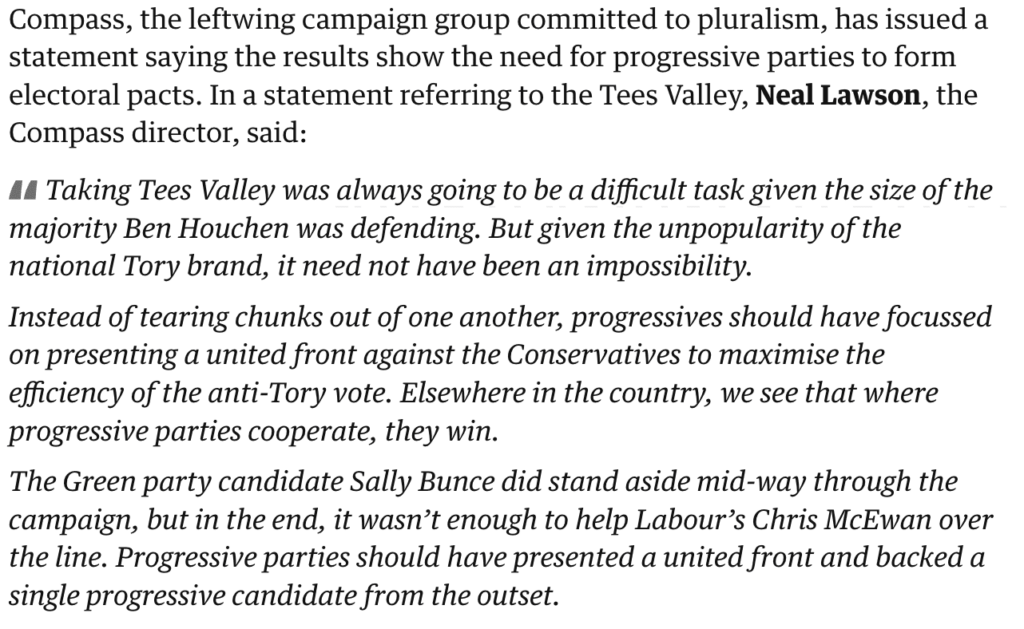For the 2024 Local Elections, we wanted to achieve two things. We want to win council representation for progressives – of course. But we also wanted to demonstrate how our political system warps the discussion and the results, and lift up the places where progressives are fighting back and winning change.That started with asking What’s a council worth?
We asked a full panel of councillors and campaigners what’s actually happening in councils around the country and what’s possible with local government, showing what difference it makes having progressives leading councils, and how cooperative pluralism encourages better progressive policy outcomes and consultative practices.
We then launched new research in the Mirror that revealed the shocking democratic deficit at the heart of Tory-run councils across the country.
A staggering 83% of the Conservative majority-run councils up for election in May 2024 were won with a minority share of the popular vote the last time they were contested, revealed in a new publication, Over the Party Wall. In light of these statistics, we urged Labour, Liberal Democrats and Greens to work together in order to better represent the progressive majority and lock the Conservatives out of power.
There were 107 councils facing re-election in May, 18 of which are majority-controlled by the Conservatives. But the Tories won 15 of these councils with less than 50% of the vote the last time they were contested. That means more than half of voters cast their ballots for parties other than the Conservatives, but the Tories still won a majority of the seats – and all of the power. On these 15 councils, the Conservatives won, on average, 59.9% of the seats with just 45.9% of the popular vote – an average democratic deficit of 14.1%. Compass labels these councils ‘tragedy councils’ because greater collaboration between progressive parties in these areas could have prevented the Tories from seizing control in a large number of them. The underlying progressive majority in these key areas also means the Tories will be extremely vulnerable to tactical voting and local cooperation between progressive parties this May.
Of the councils that were up for re-election in May, 15 were progressive partnerships or coalitions. We set out to speak to a number of their leaders, in a podcast series Local Leaders Spotlight. We spoke to Cllr Andy Graham, the Liberal Democrat leader of the West Oxfordshire District Council, where he warned against splitting the progressive vote:
Longtime friend and ally Cllr Lucy Nethsingha, joined us to talk about the lessons from leading Cambridgeshire County Council.
We also spoke to Cllr Paul Harvey, the leader of Basingstoke District Council about his experience as an Independent.
Pete Marland, Leader of Milton Keynes council, who had led the council for a number of years in a coalition talked about the reaction of his party to the coalition and his plans for the future.
Key Results
In the newly created mayoral authority of York and North Yorkshire, the party’s candidate won despite only receiving 35% of the vote.
In Suella Braverman’s backyard, there was a progressive tragedy as the Tories held Fareham Borough Council, but on a minority of the vote. They now have 71% of the seats on just 46% of the popular vote. This is what happens when we have an unequal voting system, and progressives don’t work together.
In the North East mayoral election, Kim McGuinness won for Labour, with Compass member and former mayor Jamie Driscoll coming second.
As pluralists, we want to see healthy competition as well as healthy cooperation at all levels of politics.
But First Past the Post militates against that, and tilts the scales in favour of established parties with strong brands, money and airtime.
Jamie won almost as many votes as the Tories, Greens, Lib Dems and Reform put together. His campaign showed what a strong, people-powered campaign with democracy at its core can achieve – even without the backing of an established party.
This race demonstrates that when you put participation at the heart of your campaign, you can make waves. A commitment to genuine cooperation, and to changing the voting system, should form the core of any credible progressive’s offer to the people.
Ben Houchen was defending a large majority in the Tees Valley mayoral election, so it was always going to be a challenge to oust him.
But, progressives could have united (as they have elsewhere) to challenge the Tories and maximise the anti-Tory vote.

In the East Midlands mayoral election, Claire Ward of Labour defeated Conservative MP Ben Bradley.
In Basingstoke, the Women’s Equality Party won their first ever borough council seat, with another guest on our Local Leaders Spotlight, Paul Harvey, commenting:
“It’s a wonderful result. It’s great to see so many progressive councillors being elected from across the political spectrum who have come together and want to do something incredibly positive for the community.”
In London, Sadiq Khan won a third term. Progressive voters clearly heeded Sadiq Khan’s appeal to Liberal Democrat and Green voters to get him over the line.
We should celebrate the alliance of progressive voters uniting behind Sadiq, but forcing people to vote just to keep the right out is driving distrust, alienation, and short-termism in our politics. That’s the reality under FPTP.
During the campaign, Sadiq recognised that the change to first-past-the-post for mayoral elections this time around made progressive vote-splitting a potential problem for his re-election bid.
That’s a stepping stone – he’s identified a problem in our democracy but only focused on how it affects him in this one race. We want him to join his colleagues and advocate for the solution for everyone at every election – electoral reform.
All votes should be genuinely earned, genuinely meant, and genuinely count. That means democratic renewal, starting with proportional representation.
We look forward to working with the mayors and councillors elected today to build toward that reality.
